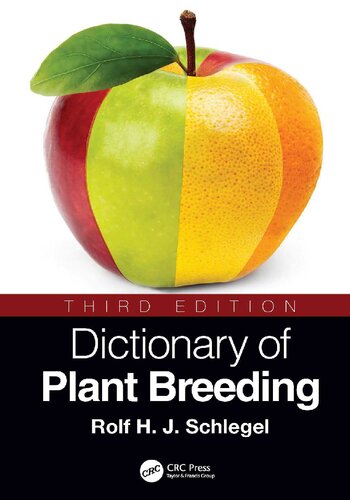

Most ebook files are in PDF format, so you can easily read them using various software such as Foxit Reader or directly on the Google Chrome browser.
Some ebook files are released by publishers in other formats such as .awz, .mobi, .epub, .fb2, etc. You may need to install specific software to read these formats on mobile/PC, such as Calibre.
Please read the tutorial at this link: https://ebookbell.com/faq
We offer FREE conversion to the popular formats you request; however, this may take some time. Therefore, right after payment, please email us, and we will try to provide the service as quickly as possible.
For some exceptional file formats or broken links (if any), please refrain from opening any disputes. Instead, email us first, and we will try to assist within a maximum of 6 hours.
EbookBell Team

4.1
100 reviewsOne of the oldest scientific traditions, plant breeding began in Neolithic times with methods as simple as saving the seeds of desirable plants and sowing them later. It was not until the re-encounter with Mendel’s discoveries thousands of years later, the genetic basis of breeding was understood. Developments following have provided further insight into how genes acting alone or in concert with other genes and the environment, result in a particular phenotype.
From Abaxial to Zymogram, the third edition of Dictionary of Plant Breeding contains clear and useful definitions of the terms associated with plant breeding and related scientific/technological disciplines. It defines jargon; provides helpful tables, examples, and breeding schemes; and includes a list of crop plants with salient details. Packed with data and organized to make that data easy to access, this revised and expanded reference provides comprehensive coverage of the latest discoveries in cytogenetics, molecular genetics, marker-assisted selection, experimental gene transfer, CRISPR technology, seed sciences, crop physiology, and genetically modified crops.
Features:
A complex subject, plant breeding draws from many scientific and technological disciplines, often making it difficult to know the precise meanings of many terms and to accurately interpret specific concepts. As in the previous editions, this dictionary unifies concepts by including the specific terms of plant breeding and terms that are adjusted from other disciplines. Drawing on Rolf Schlegel’s 50 years of experience, the book provides an encyclopedic list of commonly used technical terms that reflect the latest developments in the field.